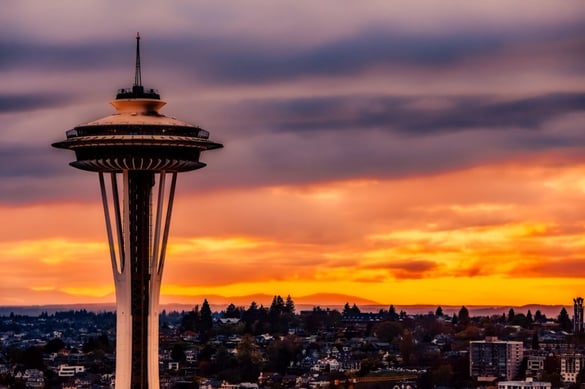Share this
Interview with Steve Clagg, Microsoft Travel Management
by Helmut Pilz on May 2, 2019 5:59:56 PM
Microsoft’s Travel Technology Manager Steve Clagg is a very thoughtful and visionary man. In our interview, we had a closer look at the impressive numbers of Microsoft’s travel programme, its key tech projects and - of course - also at his vision for travel profiles.
Steve, I’m excited to have you on our blog. Can you share some numbers
on Microsoft’s travel spend?
Absolutely,
yes! We have about 100,000 employees
and 80% of them travel for work. Currently, our annual spend is:

- about 400 million USD for air travel, which translates into over 1.5 billion air miles
- 300 million USD for hotels – that’s roughly 4,000 hotel rooms booked per day.
Our air travel also
translates into 3 million hours in
the air. Obviously, we have a vivid interest that those hours can be spent
efficiently.
How big is your travel management team?
We have 10 internal full-time employees who mostly
focus on strategic topics. In addition, there are 12 extended staff and quite a few dedicated resources at our TMC.
Is it correct that you came up with the ideas for the title and role of
Travel Technology Manager?
Yes, it was essentially a
collaborative idea between Eric Bailey and me to create this role at Microsoft.
An important part of my mission is to look for opportunities to pilot new technologies and services.
This also includes our data strategy. It might be interesting
for you to hear that GDPR has had a massive impact in the US. Unfortunately,
many companies and TMCs are quite late to the game.
Which tech solutions are currently part of Microsoft’s global travel
programme?
There are probably more than I can name here! Here’s a
good selection:
- The Roadmap app for itineraries and travel assistance
- Microsoft Dynamics as CRM for helpdesk, and various user engagement tools, including Yammer, Flow, Forms, Teams, and SharePoint.
- The Microsoft Office Stack – among others for calendar integration
- SAP Concur – mostly for booking. We’re currently piloting Expense as well
- Tripism for destination research and corporate benefits
- Microsoft Bot Framework for helpdesk purposes such as policy questions
- A consolidated data lake built on Microsoft Azure, and leveraging Azure AI, Machine Learning, and Cognitive Services.
- Microsoft PowerBI visualisation tool for data analytics

What are your key projects for the next years?
- Data analytics. This has a huge potential to be used outside of
Microsoft’s own travel programme. - Smart contracts through blockchain. With this in place, there will be
absolutely no need to queue at hotel reception desks! - Traveller identity and individualised footprints based on a profile.
- Booking ++. The booking process can be massively improved in
terms of personalisation, and new content distribution paths - Supplier Commodities. Maximize the value of
preferred partnerships, digital transformations that increase value to all
parties – employees, corporate, and suppliers.
Please share your thoughts and ideas about traveler profiles! What is reality and what is your vision?
The current
reality is that the data is all over the place and very fragmented.
My vision
is that a traveller owns his/her own data and is in the driver’s seat when it
comes to sharing it. The profile data will be aggregated from all kinds of
sources and drive the traveller experience.
I’m quite optimistic that we will get there and tools like Umbrella Faces could play a key role in
this development.
The biggest challenge could be
the monetisation model as commercial interests might be in the way of a traveller-owned
profile. A possible solution to that problem could be non-profit models such as
one sees in Winding Tree or ID2020.
Tell us a bit about yourself. Where did you grow up and where do you
live?
I was born and raised in Seattle and still live here, so the Pacific Northwest is my home.
But I haven’t been here all my life.
I spent three wonderful years in Austria, where I moved on a Fulbright
sponsorship in my early 20s. After returning to the US, I had several
stints in other US cities like Dallas.

You seem to love traveling. What were your most remarkable experiences?
My most bizarre
travel experience was actually in Switzerland! In my early days, I travelled
with a friend through Europe and we were both into punk and grunge. He proposed
that we stay with some people he knew in Zurich.
When we arrived, I found out that they were squatters and lived in an abandoned
building.
Today, I am a big fan of adding leisure to business trips. My favourite destination is the Cote d’Azur in Southern France, to where
I’ve fortunately traveled for some Amadeus
projects. Nice is such a wonderful
town.
Thank you, Steve!
Share this
- January 2026 (1)
- December 2025 (3)
- November 2025 (2)
- August 2025 (1)
- March 2025 (1)
- February 2025 (1)
- October 2024 (2)
- July 2024 (1)
- April 2024 (1)
- March 2024 (1)
- June 2023 (1)
- April 2023 (1)
- March 2023 (1)
- February 2023 (1)
- December 2022 (1)
- September 2022 (1)
- June 2022 (5)
- April 2022 (1)
- October 2021 (2)
- September 2021 (4)
- August 2021 (3)
- July 2021 (1)
- June 2021 (1)
- May 2021 (1)
- April 2021 (1)
- March 2021 (1)
- December 2020 (1)
- October 2020 (1)
- September 2020 (2)
- August 2020 (1)
- June 2020 (1)
- May 2020 (2)
- December 2019 (2)
- November 2019 (1)
- September 2019 (1)
- June 2019 (1)
- May 2019 (2)
- April 2019 (1)
- February 2019 (4)
- January 2019 (1)
- December 2018 (1)
- November 2018 (2)
- October 2018 (2)
- September 2018 (3)
- August 2018 (1)
- June 2018 (2)
- May 2018 (1)
- March 2018 (3)
- January 2018 (1)
- December 2017 (1)
- November 2017 (3)
- October 2017 (3)
- September 2017 (1)
- August 2017 (1)
- July 2017 (2)
- May 2017 (3)
- April 2017 (1)
- March 2017 (2)
- January 2017 (2)
- December 2016 (2)
- October 2016 (2)
- September 2016 (2)
- August 2016 (1)
- July 2016 (2)
- June 2016 (2)
- May 2016 (2)
- April 2016 (4)